Economic and Financial Management: Business Impact Analysis Report
VerifiedAdded on 2022/12/12
|8
|1958
|319
Report
AI Summary
This report examines the economic and financial management of a public sector organization, the Department of Environment, Food and Rural Affairs (DEFRA) in the UK. It begins with an introduction to business economics and its application, then explores the impact of the economy on business operations, including profitability, opportunities, sales, and decision-making. The report then applies economic theories like supply and demand, Marxism, and market socialism to a business context, followed by an analysis of micro and macro forces affecting contemporary businesses, such as customers, suppliers, competitors, demographic, and technological factors. The conclusion summarizes key findings, emphasizing the importance of strategic planning to navigate economic challenges. This report aims to provide an in-depth understanding of how economic factors influence business performance and decision-making within a public sector organization.
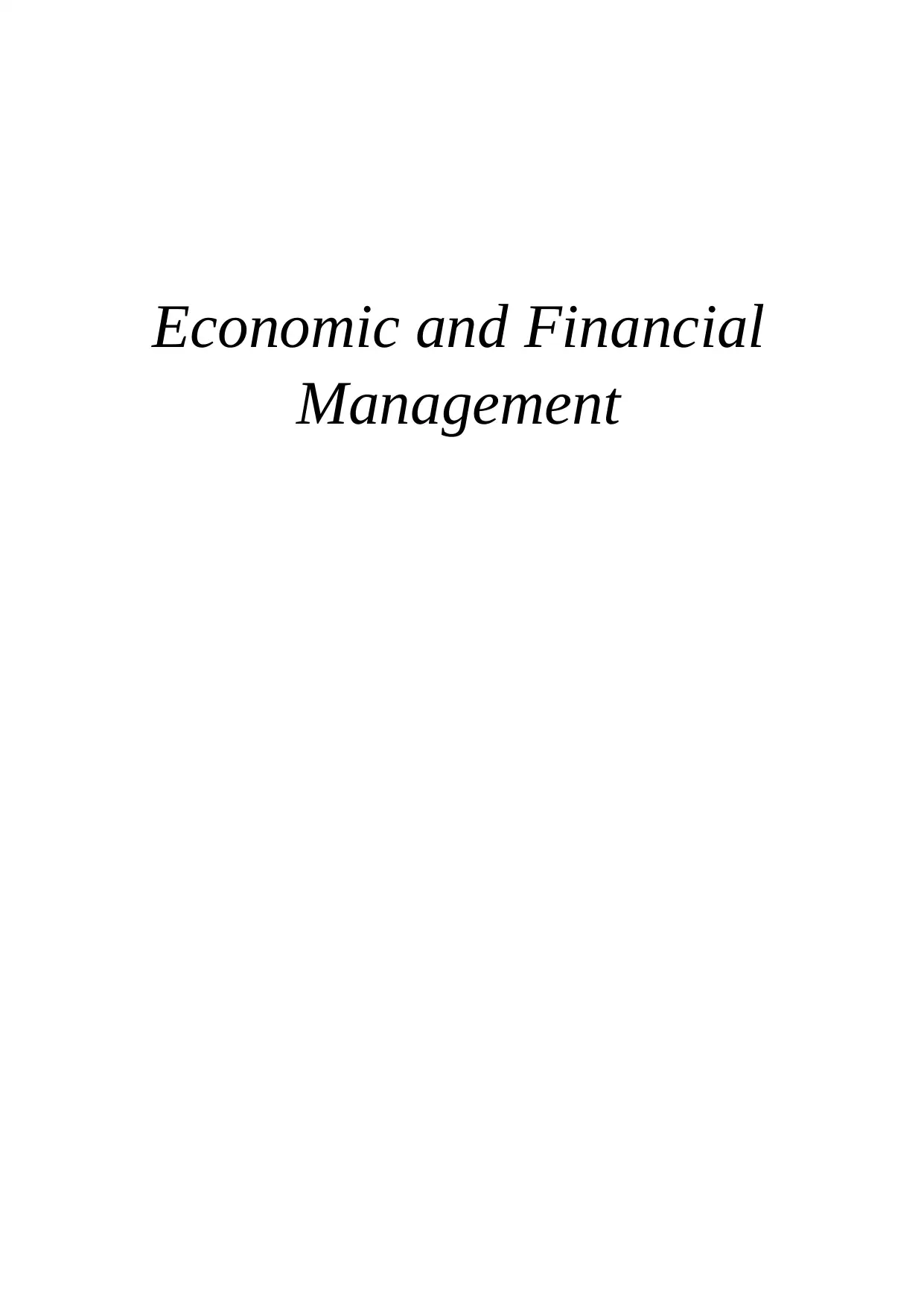
Economic and Financial
Management
Management
Paraphrase This Document
Need a fresh take? Get an instant paraphrase of this document with our AI Paraphraser
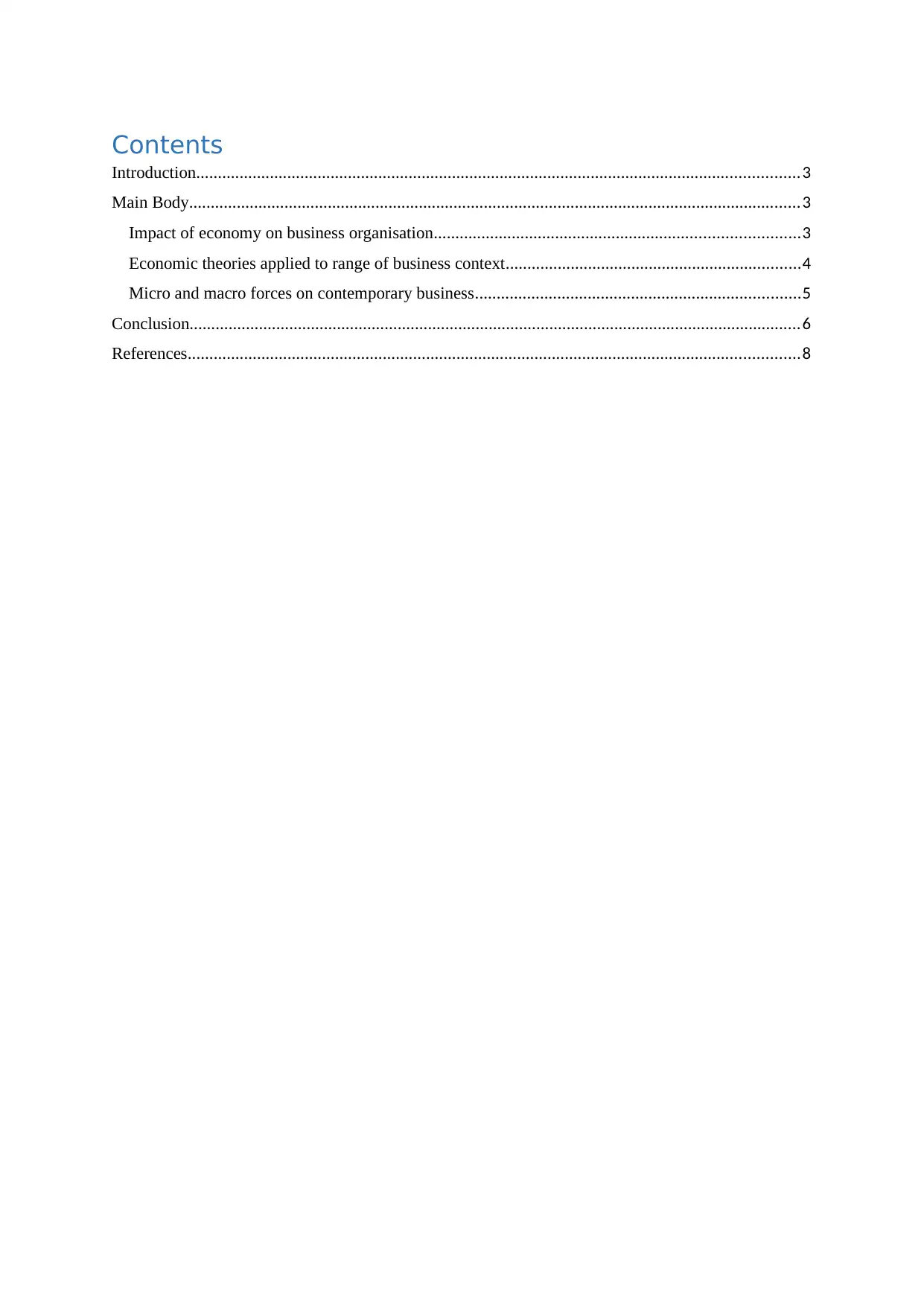
Contents
Introduction...........................................................................................................................................3
Main Body.............................................................................................................................................3
Impact of economy on business organisation....................................................................................3
Economic theories applied to range of business context....................................................................4
Micro and macro forces on contemporary business...........................................................................5
Conclusion.............................................................................................................................................6
References.............................................................................................................................................8
Introduction...........................................................................................................................................3
Main Body.............................................................................................................................................3
Impact of economy on business organisation....................................................................................3
Economic theories applied to range of business context....................................................................4
Micro and macro forces on contemporary business...........................................................................5
Conclusion.............................................................................................................................................6
References.............................................................................................................................................8
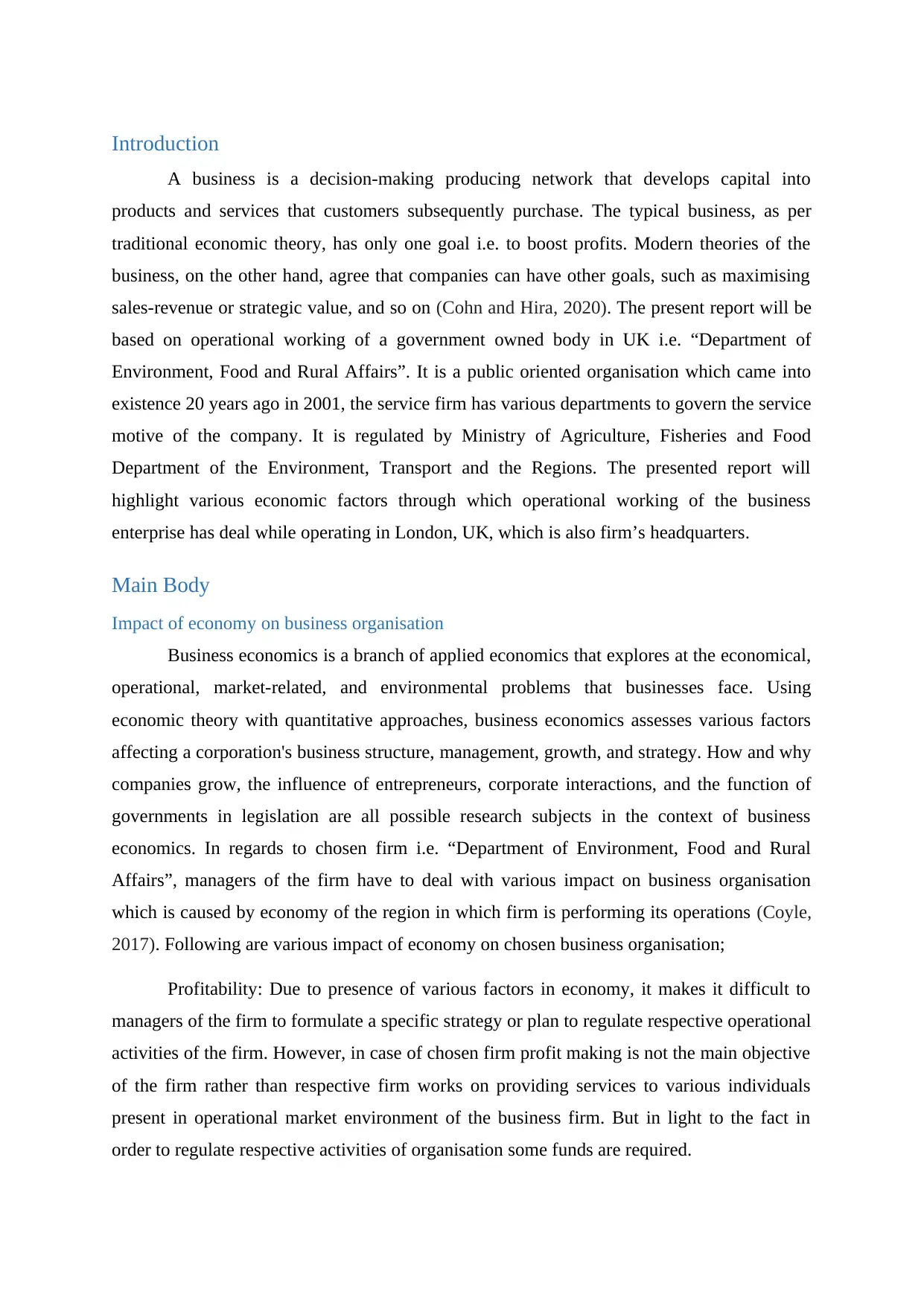
Introduction
A business is a decision-making producing network that develops capital into
products and services that customers subsequently purchase. The typical business, as per
traditional economic theory, has only one goal i.e. to boost profits. Modern theories of the
business, on the other hand, agree that companies can have other goals, such as maximising
sales-revenue or strategic value, and so on (Cohn and Hira, 2020). The present report will be
based on operational working of a government owned body in UK i.e. “Department of
Environment, Food and Rural Affairs”. It is a public oriented organisation which came into
existence 20 years ago in 2001, the service firm has various departments to govern the service
motive of the company. It is regulated by Ministry of Agriculture, Fisheries and Food
Department of the Environment, Transport and the Regions. The presented report will
highlight various economic factors through which operational working of the business
enterprise has deal while operating in London, UK, which is also firm’s headquarters.
Main Body
Impact of economy on business organisation
Business economics is a branch of applied economics that explores at the economical,
operational, market-related, and environmental problems that businesses face. Using
economic theory with quantitative approaches, business economics assesses various factors
affecting a corporation's business structure, management, growth, and strategy. How and why
companies grow, the influence of entrepreneurs, corporate interactions, and the function of
governments in legislation are all possible research subjects in the context of business
economics. In regards to chosen firm i.e. “Department of Environment, Food and Rural
Affairs”, managers of the firm have to deal with various impact on business organisation
which is caused by economy of the region in which firm is performing its operations (Coyle,
2017). Following are various impact of economy on chosen business organisation;
Profitability: Due to presence of various factors in economy, it makes it difficult to
managers of the firm to formulate a specific strategy or plan to regulate respective operational
activities of the firm. However, in case of chosen firm profit making is not the main objective
of the firm rather than respective firm works on providing services to various individuals
present in operational market environment of the business firm. But in light to the fact in
order to regulate respective activities of organisation some funds are required.
A business is a decision-making producing network that develops capital into
products and services that customers subsequently purchase. The typical business, as per
traditional economic theory, has only one goal i.e. to boost profits. Modern theories of the
business, on the other hand, agree that companies can have other goals, such as maximising
sales-revenue or strategic value, and so on (Cohn and Hira, 2020). The present report will be
based on operational working of a government owned body in UK i.e. “Department of
Environment, Food and Rural Affairs”. It is a public oriented organisation which came into
existence 20 years ago in 2001, the service firm has various departments to govern the service
motive of the company. It is regulated by Ministry of Agriculture, Fisheries and Food
Department of the Environment, Transport and the Regions. The presented report will
highlight various economic factors through which operational working of the business
enterprise has deal while operating in London, UK, which is also firm’s headquarters.
Main Body
Impact of economy on business organisation
Business economics is a branch of applied economics that explores at the economical,
operational, market-related, and environmental problems that businesses face. Using
economic theory with quantitative approaches, business economics assesses various factors
affecting a corporation's business structure, management, growth, and strategy. How and why
companies grow, the influence of entrepreneurs, corporate interactions, and the function of
governments in legislation are all possible research subjects in the context of business
economics. In regards to chosen firm i.e. “Department of Environment, Food and Rural
Affairs”, managers of the firm have to deal with various impact on business organisation
which is caused by economy of the region in which firm is performing its operations (Coyle,
2017). Following are various impact of economy on chosen business organisation;
Profitability: Due to presence of various factors in economy, it makes it difficult to
managers of the firm to formulate a specific strategy or plan to regulate respective operational
activities of the firm. However, in case of chosen firm profit making is not the main objective
of the firm rather than respective firm works on providing services to various individuals
present in operational market environment of the business firm. But in light to the fact in
order to regulate respective activities of organisation some funds are required.
⊘ This is a preview!⊘
Do you want full access?
Subscribe today to unlock all pages.

Trusted by 1+ million students worldwide
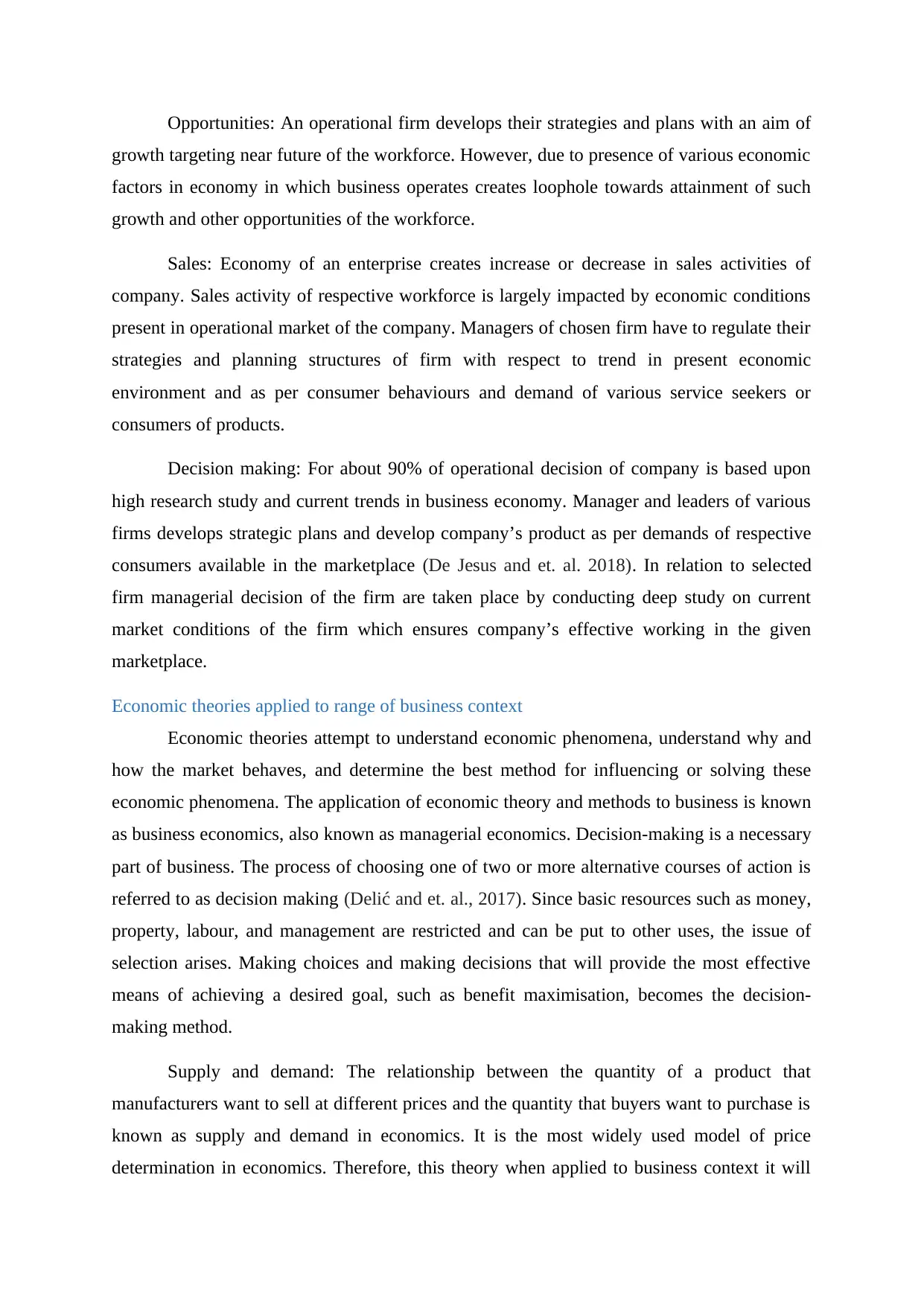
Opportunities: An operational firm develops their strategies and plans with an aim of
growth targeting near future of the workforce. However, due to presence of various economic
factors in economy in which business operates creates loophole towards attainment of such
growth and other opportunities of the workforce.
Sales: Economy of an enterprise creates increase or decrease in sales activities of
company. Sales activity of respective workforce is largely impacted by economic conditions
present in operational market of the company. Managers of chosen firm have to regulate their
strategies and planning structures of firm with respect to trend in present economic
environment and as per consumer behaviours and demand of various service seekers or
consumers of products.
Decision making: For about 90% of operational decision of company is based upon
high research study and current trends in business economy. Manager and leaders of various
firms develops strategic plans and develop company’s product as per demands of respective
consumers available in the marketplace (De Jesus and et. al. 2018). In relation to selected
firm managerial decision of the firm are taken place by conducting deep study on current
market conditions of the firm which ensures company’s effective working in the given
marketplace.
Economic theories applied to range of business context
Economic theories attempt to understand economic phenomena, understand why and
how the market behaves, and determine the best method for influencing or solving these
economic phenomena. The application of economic theory and methods to business is known
as business economics, also known as managerial economics. Decision-making is a necessary
part of business. The process of choosing one of two or more alternative courses of action is
referred to as decision making (Delić and et. al., 2017). Since basic resources such as money,
property, labour, and management are restricted and can be put to other uses, the issue of
selection arises. Making choices and making decisions that will provide the most effective
means of achieving a desired goal, such as benefit maximisation, becomes the decision-
making method.
Supply and demand: The relationship between the quantity of a product that
manufacturers want to sell at different prices and the quantity that buyers want to purchase is
known as supply and demand in economics. It is the most widely used model of price
determination in economics. Therefore, this theory when applied to business context it will
growth targeting near future of the workforce. However, due to presence of various economic
factors in economy in which business operates creates loophole towards attainment of such
growth and other opportunities of the workforce.
Sales: Economy of an enterprise creates increase or decrease in sales activities of
company. Sales activity of respective workforce is largely impacted by economic conditions
present in operational market of the company. Managers of chosen firm have to regulate their
strategies and planning structures of firm with respect to trend in present economic
environment and as per consumer behaviours and demand of various service seekers or
consumers of products.
Decision making: For about 90% of operational decision of company is based upon
high research study and current trends in business economy. Manager and leaders of various
firms develops strategic plans and develop company’s product as per demands of respective
consumers available in the marketplace (De Jesus and et. al. 2018). In relation to selected
firm managerial decision of the firm are taken place by conducting deep study on current
market conditions of the firm which ensures company’s effective working in the given
marketplace.
Economic theories applied to range of business context
Economic theories attempt to understand economic phenomena, understand why and
how the market behaves, and determine the best method for influencing or solving these
economic phenomena. The application of economic theory and methods to business is known
as business economics, also known as managerial economics. Decision-making is a necessary
part of business. The process of choosing one of two or more alternative courses of action is
referred to as decision making (Delić and et. al., 2017). Since basic resources such as money,
property, labour, and management are restricted and can be put to other uses, the issue of
selection arises. Making choices and making decisions that will provide the most effective
means of achieving a desired goal, such as benefit maximisation, becomes the decision-
making method.
Supply and demand: The relationship between the quantity of a product that
manufacturers want to sell at different prices and the quantity that buyers want to purchase is
known as supply and demand in economics. It is the most widely used model of price
determination in economics. Therefore, this theory when applied to business context it will
Paraphrase This Document
Need a fresh take? Get an instant paraphrase of this document with our AI Paraphraser
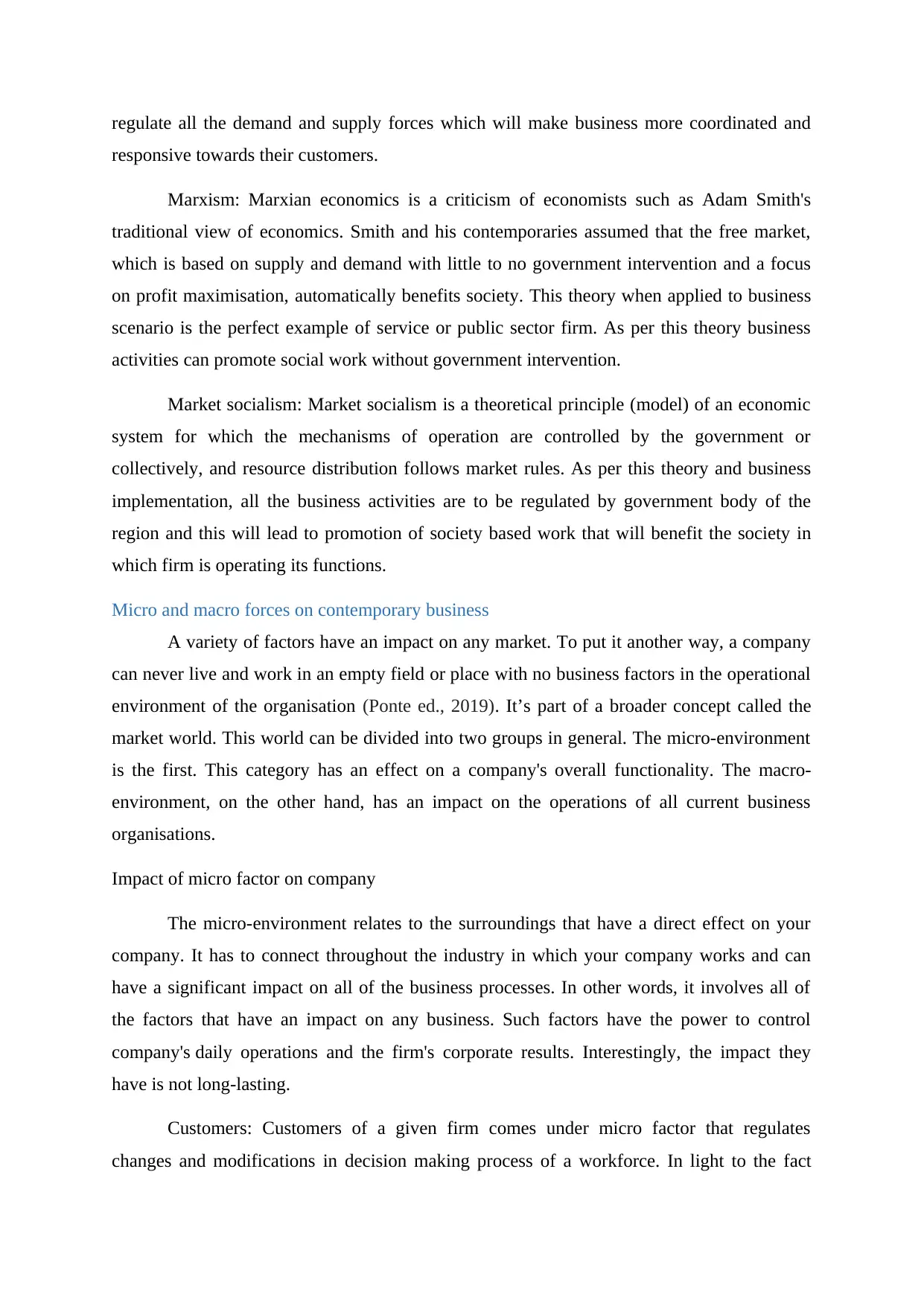
regulate all the demand and supply forces which will make business more coordinated and
responsive towards their customers.
Marxism: Marxian economics is a criticism of economists such as Adam Smith's
traditional view of economics. Smith and his contemporaries assumed that the free market,
which is based on supply and demand with little to no government intervention and a focus
on profit maximisation, automatically benefits society. This theory when applied to business
scenario is the perfect example of service or public sector firm. As per this theory business
activities can promote social work without government intervention.
Market socialism: Market socialism is a theoretical principle (model) of an economic
system for which the mechanisms of operation are controlled by the government or
collectively, and resource distribution follows market rules. As per this theory and business
implementation, all the business activities are to be regulated by government body of the
region and this will lead to promotion of society based work that will benefit the society in
which firm is operating its functions.
Micro and macro forces on contemporary business
A variety of factors have an impact on any market. To put it another way, a company
can never live and work in an empty field or place with no business factors in the operational
environment of the organisation (Ponte ed., 2019). It’s part of a broader concept called the
market world. This world can be divided into two groups in general. The micro-environment
is the first. This category has an effect on a company's overall functionality. The macro-
environment, on the other hand, has an impact on the operations of all current business
organisations.
Impact of micro factor on company
The micro-environment relates to the surroundings that have a direct effect on your
company. It has to connect throughout the industry in which your company works and can
have a significant impact on all of the business processes. In other words, it involves all of
the factors that have an impact on any business. Such factors have the power to control
company's daily operations and the firm's corporate results. Interestingly, the impact they
have is not long-lasting.
Customers: Customers of a given firm comes under micro factor that regulates
changes and modifications in decision making process of a workforce. In light to the fact
responsive towards their customers.
Marxism: Marxian economics is a criticism of economists such as Adam Smith's
traditional view of economics. Smith and his contemporaries assumed that the free market,
which is based on supply and demand with little to no government intervention and a focus
on profit maximisation, automatically benefits society. This theory when applied to business
scenario is the perfect example of service or public sector firm. As per this theory business
activities can promote social work without government intervention.
Market socialism: Market socialism is a theoretical principle (model) of an economic
system for which the mechanisms of operation are controlled by the government or
collectively, and resource distribution follows market rules. As per this theory and business
implementation, all the business activities are to be regulated by government body of the
region and this will lead to promotion of society based work that will benefit the society in
which firm is operating its functions.
Micro and macro forces on contemporary business
A variety of factors have an impact on any market. To put it another way, a company
can never live and work in an empty field or place with no business factors in the operational
environment of the organisation (Ponte ed., 2019). It’s part of a broader concept called the
market world. This world can be divided into two groups in general. The micro-environment
is the first. This category has an effect on a company's overall functionality. The macro-
environment, on the other hand, has an impact on the operations of all current business
organisations.
Impact of micro factor on company
The micro-environment relates to the surroundings that have a direct effect on your
company. It has to connect throughout the industry in which your company works and can
have a significant impact on all of the business processes. In other words, it involves all of
the factors that have an impact on any business. Such factors have the power to control
company's daily operations and the firm's corporate results. Interestingly, the impact they
have is not long-lasting.
Customers: Customers of a given firm comes under micro factor that regulates
changes and modifications in decision making process of a workforce. In light to the fact
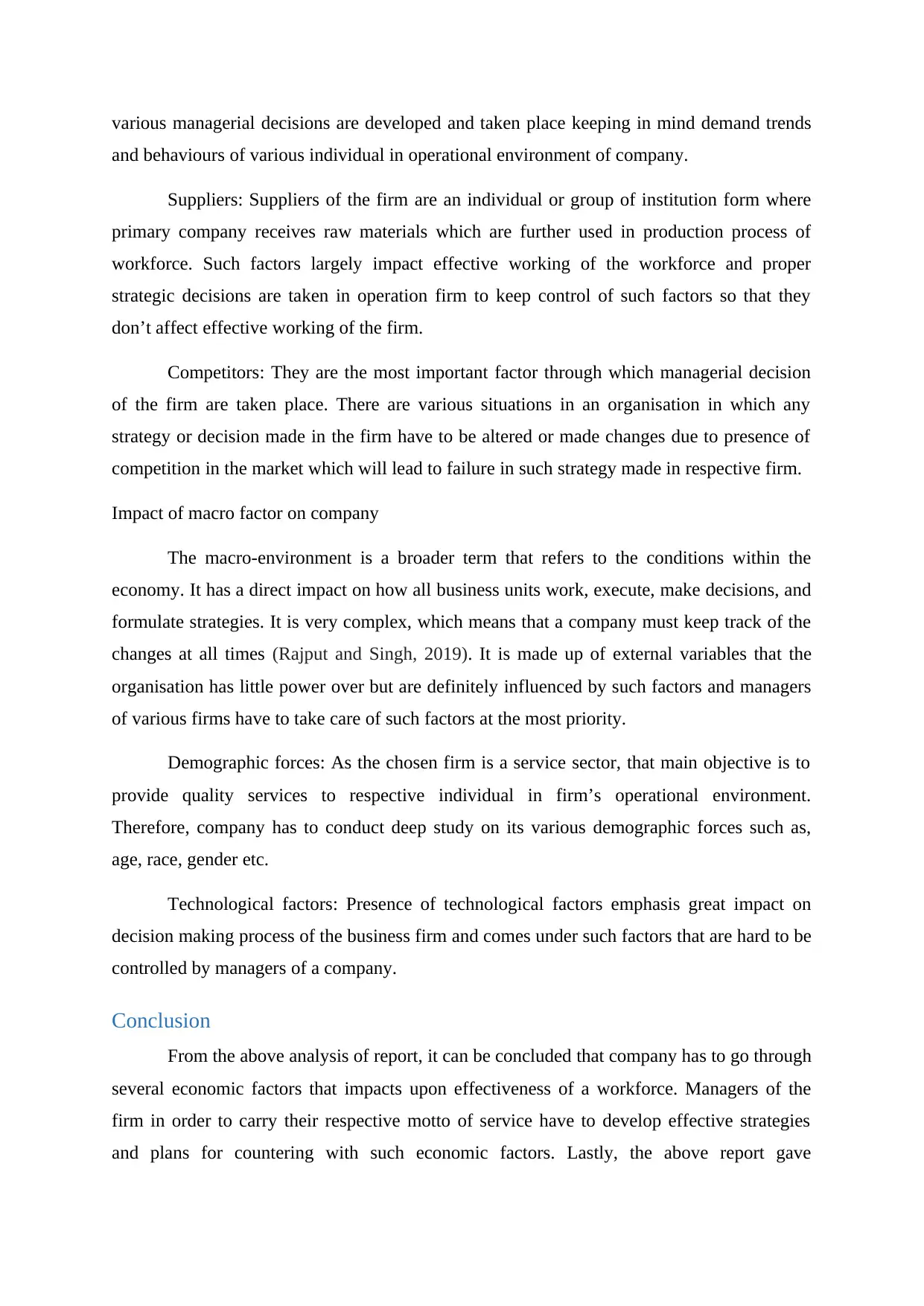
various managerial decisions are developed and taken place keeping in mind demand trends
and behaviours of various individual in operational environment of company.
Suppliers: Suppliers of the firm are an individual or group of institution form where
primary company receives raw materials which are further used in production process of
workforce. Such factors largely impact effective working of the workforce and proper
strategic decisions are taken in operation firm to keep control of such factors so that they
don’t affect effective working of the firm.
Competitors: They are the most important factor through which managerial decision
of the firm are taken place. There are various situations in an organisation in which any
strategy or decision made in the firm have to be altered or made changes due to presence of
competition in the market which will lead to failure in such strategy made in respective firm.
Impact of macro factor on company
The macro-environment is a broader term that refers to the conditions within the
economy. It has a direct impact on how all business units work, execute, make decisions, and
formulate strategies. It is very complex, which means that a company must keep track of the
changes at all times (Rajput and Singh, 2019). It is made up of external variables that the
organisation has little power over but are definitely influenced by such factors and managers
of various firms have to take care of such factors at the most priority.
Demographic forces: As the chosen firm is a service sector, that main objective is to
provide quality services to respective individual in firm’s operational environment.
Therefore, company has to conduct deep study on its various demographic forces such as,
age, race, gender etc.
Technological factors: Presence of technological factors emphasis great impact on
decision making process of the business firm and comes under such factors that are hard to be
controlled by managers of a company.
Conclusion
From the above analysis of report, it can be concluded that company has to go through
several economic factors that impacts upon effectiveness of a workforce. Managers of the
firm in order to carry their respective motto of service have to develop effective strategies
and plans for countering with such economic factors. Lastly, the above report gave
and behaviours of various individual in operational environment of company.
Suppliers: Suppliers of the firm are an individual or group of institution form where
primary company receives raw materials which are further used in production process of
workforce. Such factors largely impact effective working of the workforce and proper
strategic decisions are taken in operation firm to keep control of such factors so that they
don’t affect effective working of the firm.
Competitors: They are the most important factor through which managerial decision
of the firm are taken place. There are various situations in an organisation in which any
strategy or decision made in the firm have to be altered or made changes due to presence of
competition in the market which will lead to failure in such strategy made in respective firm.
Impact of macro factor on company
The macro-environment is a broader term that refers to the conditions within the
economy. It has a direct impact on how all business units work, execute, make decisions, and
formulate strategies. It is very complex, which means that a company must keep track of the
changes at all times (Rajput and Singh, 2019). It is made up of external variables that the
organisation has little power over but are definitely influenced by such factors and managers
of various firms have to take care of such factors at the most priority.
Demographic forces: As the chosen firm is a service sector, that main objective is to
provide quality services to respective individual in firm’s operational environment.
Therefore, company has to conduct deep study on its various demographic forces such as,
age, race, gender etc.
Technological factors: Presence of technological factors emphasis great impact on
decision making process of the business firm and comes under such factors that are hard to be
controlled by managers of a company.
Conclusion
From the above analysis of report, it can be concluded that company has to go through
several economic factors that impacts upon effectiveness of a workforce. Managers of the
firm in order to carry their respective motto of service have to develop effective strategies
and plans for countering with such economic factors. Lastly, the above report gave
⊘ This is a preview!⊘
Do you want full access?
Subscribe today to unlock all pages.

Trusted by 1+ million students worldwide
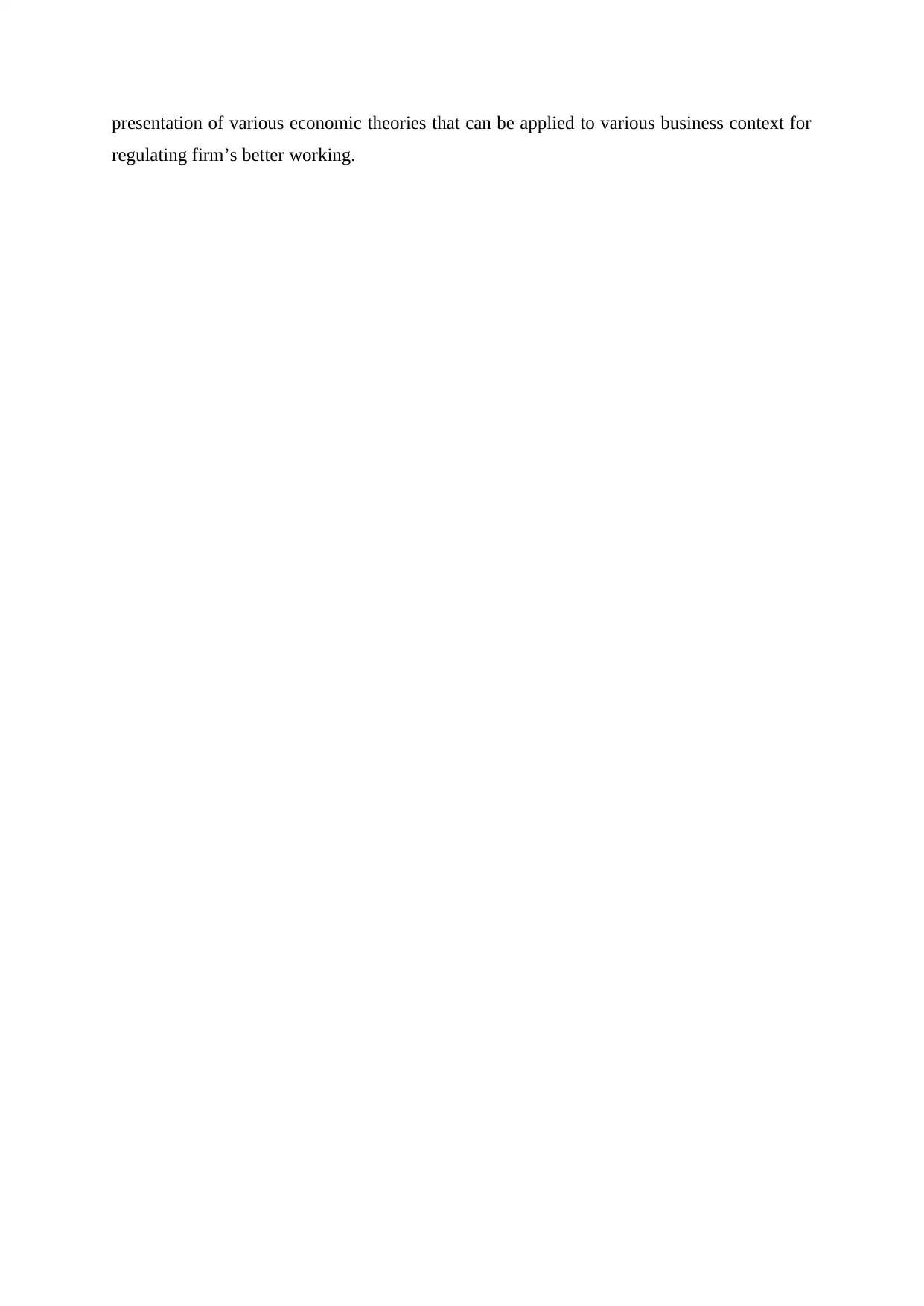
presentation of various economic theories that can be applied to various business context for
regulating firm’s better working.
regulating firm’s better working.
Paraphrase This Document
Need a fresh take? Get an instant paraphrase of this document with our AI Paraphraser
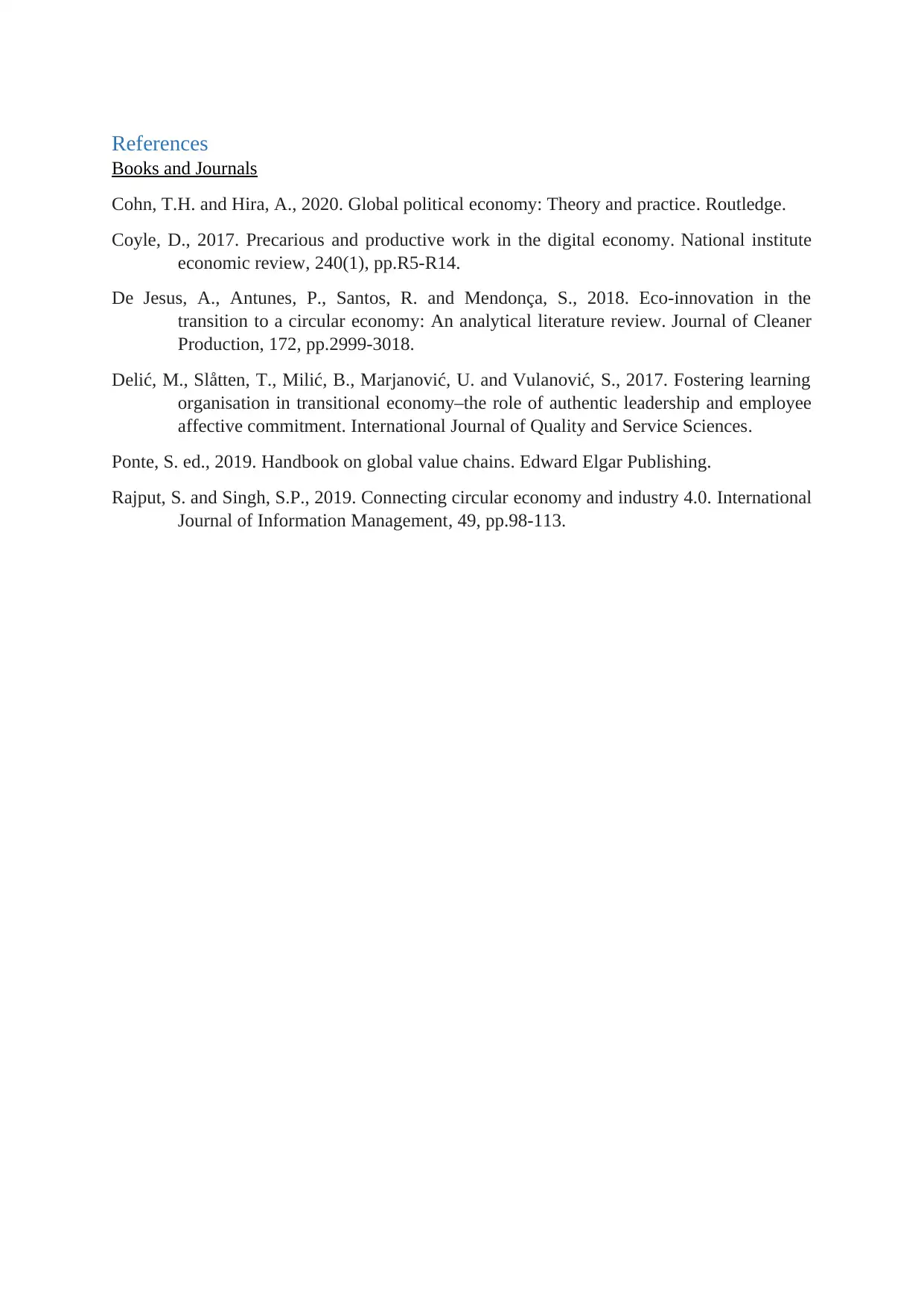
References
Books and Journals
Cohn, T.H. and Hira, A., 2020. Global political economy: Theory and practice. Routledge.
Coyle, D., 2017. Precarious and productive work in the digital economy. National institute
economic review, 240(1), pp.R5-R14.
De Jesus, A., Antunes, P., Santos, R. and Mendonça, S., 2018. Eco-innovation in the
transition to a circular economy: An analytical literature review. Journal of Cleaner
Production, 172, pp.2999-3018.
Delić, M., Slåtten, T., Milić, B., Marjanović, U. and Vulanović, S., 2017. Fostering learning
organisation in transitional economy–the role of authentic leadership and employee
affective commitment. International Journal of Quality and Service Sciences.
Ponte, S. ed., 2019. Handbook on global value chains. Edward Elgar Publishing.
Rajput, S. and Singh, S.P., 2019. Connecting circular economy and industry 4.0. International
Journal of Information Management, 49, pp.98-113.
Books and Journals
Cohn, T.H. and Hira, A., 2020. Global political economy: Theory and practice. Routledge.
Coyle, D., 2017. Precarious and productive work in the digital economy. National institute
economic review, 240(1), pp.R5-R14.
De Jesus, A., Antunes, P., Santos, R. and Mendonça, S., 2018. Eco-innovation in the
transition to a circular economy: An analytical literature review. Journal of Cleaner
Production, 172, pp.2999-3018.
Delić, M., Slåtten, T., Milić, B., Marjanović, U. and Vulanović, S., 2017. Fostering learning
organisation in transitional economy–the role of authentic leadership and employee
affective commitment. International Journal of Quality and Service Sciences.
Ponte, S. ed., 2019. Handbook on global value chains. Edward Elgar Publishing.
Rajput, S. and Singh, S.P., 2019. Connecting circular economy and industry 4.0. International
Journal of Information Management, 49, pp.98-113.
1 out of 8
Related Documents
Your All-in-One AI-Powered Toolkit for Academic Success.
+13062052269
info@desklib.com
Available 24*7 on WhatsApp / Email
![[object Object]](/_next/static/media/star-bottom.7253800d.svg)
Unlock your academic potential
Copyright © 2020–2025 A2Z Services. All Rights Reserved. Developed and managed by ZUCOL.





